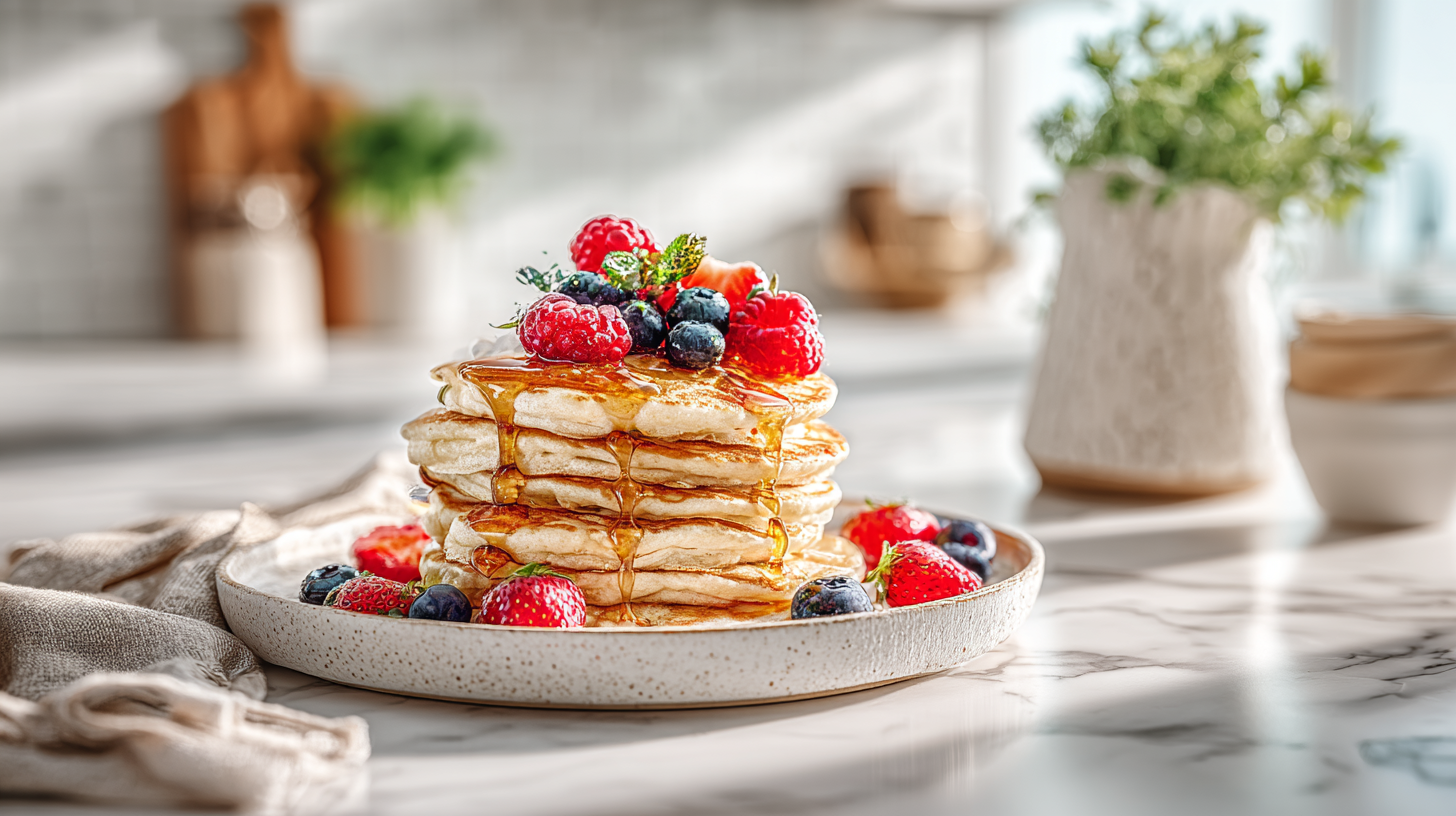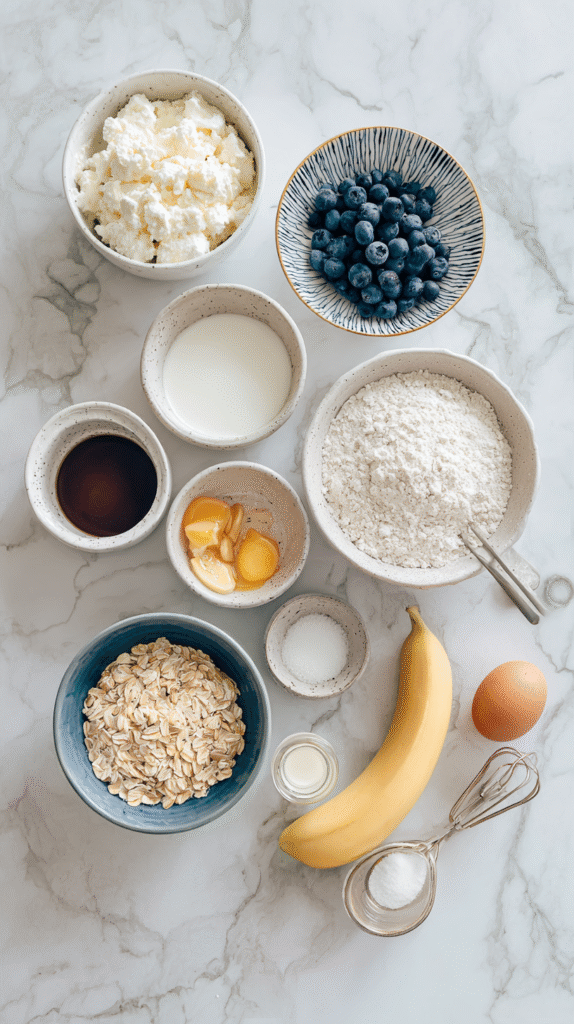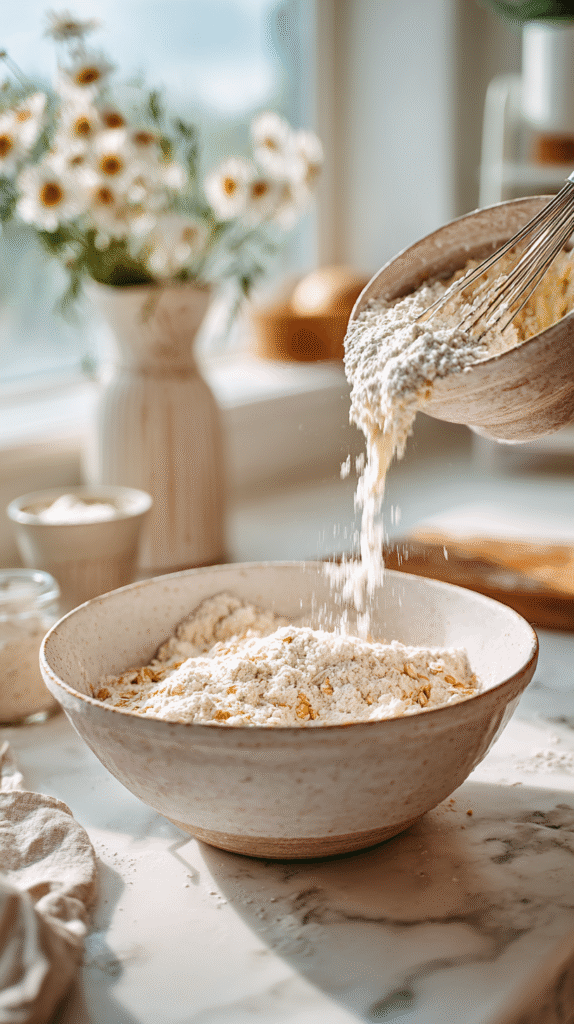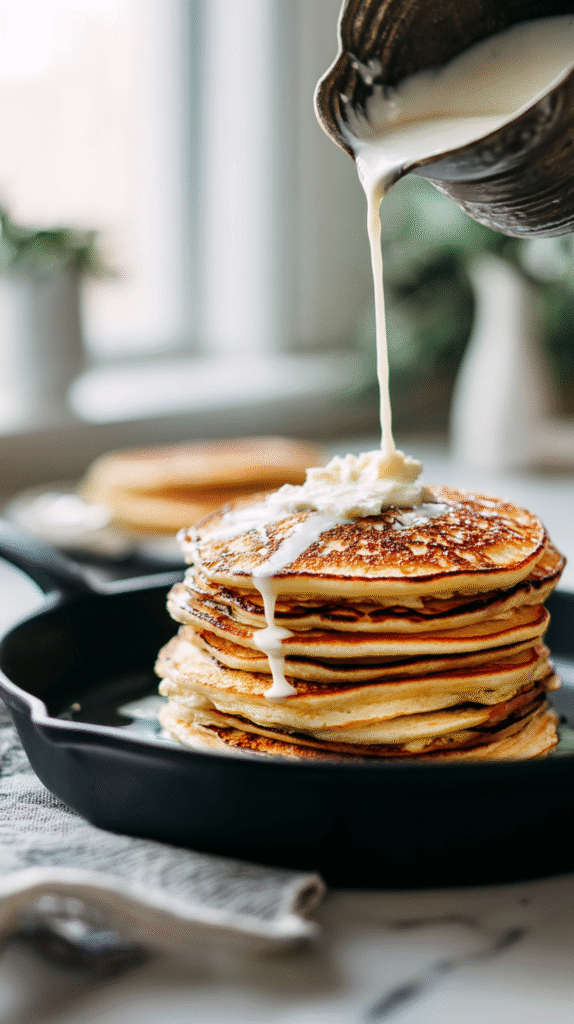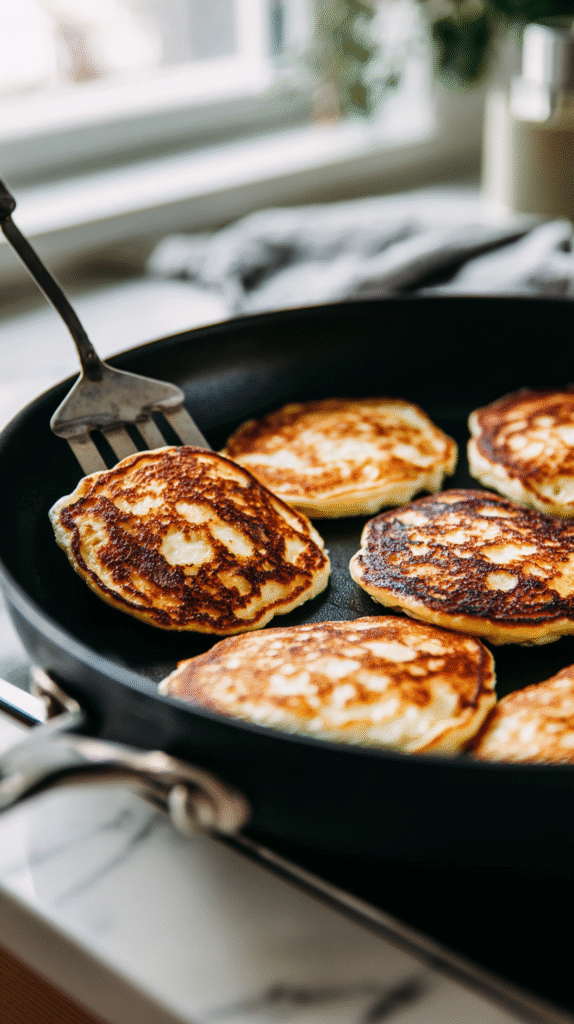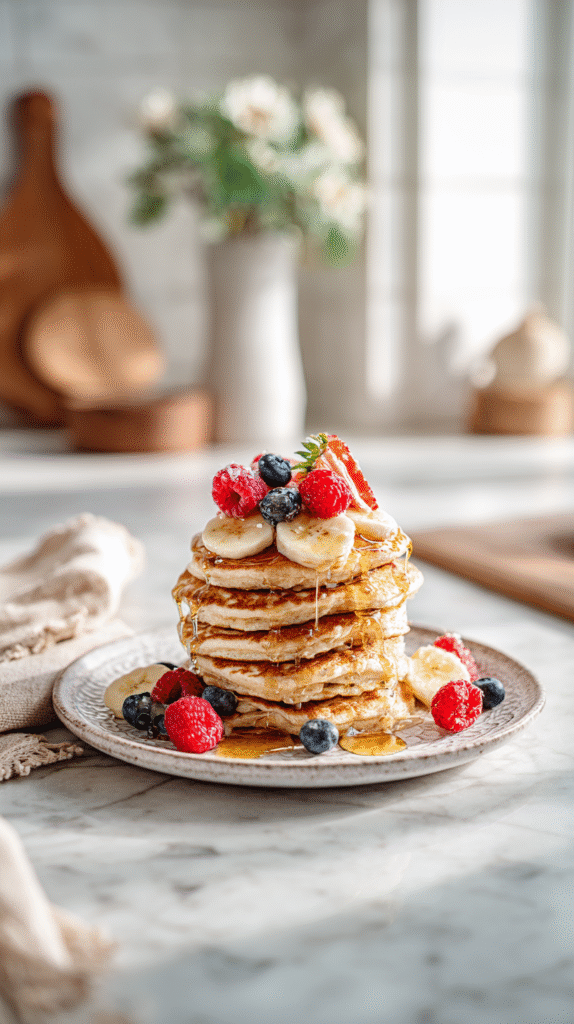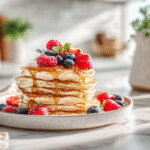If you’ve ever craved pancakes that taste indulgent but still pack a powerful punch of protein, then high-protein cottage cheese pancakes might just be your new breakfast favorite. This article dives into what makes them so special, how to prepare them, and why they’re worth adding to your morning rotation. Along the way, I’ll share my own pancake story, cooking tips, flavor twists, and answers to the most common pancake questions, so you’ll feel ready to whip up a batch in your own kitchen.
Why I Fell in Love with High-Protein Pancakes
Growing up, weekends meant pancake breakfasts. My mom would set the table with syrup, fresh fruit, and stacks of golden flapjacks. They were warm and comforting, but I always found myself crashing a few hours later, hungry all over again. Years later, when I started experimenting in the kitchen, I discovered high-protein cottage cheese pancakes. They gave me the nostalgic taste I loved, but with the staying power I needed to get through busy mornings. The cottage cheese adds creaminess, while eggs and oats hold everything together for a fluffy bite that’s both satisfying and wholesome.
It reminded me of how other recipes can balance comfort with nutrition. For example, these blueberry cheesecake swirl cookies bring indulgence and balance in every bite, much like these protein-rich pancakes.
What Makes Cottage Cheese Pancakes Special
Regular pancakes are soft and sweet, but often heavy on refined flour and sugar. High-protein cottage cheese pancakes flip that script by focusing on nutrient-rich ingredients. A single serving can easily deliver over 15 grams of protein, making them ideal for anyone who wants more energy, better recovery after workouts, or simply a breakfast that keeps hunger at bay.
The texture is another surprise. Cottage cheese melts into the batter, creating a light and fluffy pancake with a delicate tang. Paired with fruit, nut butter, or a drizzle of maple syrup, they taste just as indulgent as diner-style stacks but leave you feeling fueled instead of sluggish.
I love how versatile they are, too. You can make them sweet with bananas or blueberries, or lean savory with herbs and a side of avocado. That adaptability reminds me of playful recipes like strawberry mochi, where a classic comfort food gets an exciting twist.
These high-protein cottage cheese pancakes are more than breakfast; they’re proof that comfort and health don’t need to compete.
Core Ingredients for High-Protein Pancakes
At the heart of high-protein cottage cheese pancakes are just a few simple ingredients that deliver big results. Cottage cheese provides both protein and creaminess, making the batter rich without being heavy. Eggs add structure and even more protein, while oats or almond flour give the pancakes a wholesome texture that holds together beautifully. A touch of baking powder ensures a fluffy rise, and vanilla or cinnamon adds warmth and flavor.
The best part? You don’t need fancy protein powders to enjoy these. The natural protein from the cottage cheese and eggs does the job while keeping the pancakes tasting authentic. If you’ve ever baked with oats, you’ll recognize the comforting flavor they bring—it’s the same cozy vibe you’ll find in treats like pumpkin pie cookies.
These ingredients also make the recipe incredibly adaptable. You can blend everything in a high-speed blender for a smooth, pourable batter, or mix by hand if you prefer a little texture. Either way, the result is a pancake that feels indulgent yet fuels your day.
Also Read: Keto Philly Cheesesteak Rolls: The Low-Carb Comfort You Didn’t Know You Needed
Tasty Flavor Variations to Try
The beauty of high-protein cottage cheese pancakes is how easy they are to customize. If you’re craving natural sweetness, blend in half a ripe banana or a handful of blueberries. For chocolate lovers, a spoonful of cocoa powder or mini chocolate chips creates a dessert-like breakfast.
If you prefer savory, skip the vanilla and cinnamon, and instead add chives, garlic powder, or shredded cheddar. Pair them with smoked salmon or avocado for a protein-rich brunch plate.
When I want a more adventurous flavor, I like to take inspiration from recipes that experiment with textures and fillings, like this German Bee Sting Cake. It shows how layering flavors can turn something simple into something unforgettable.
These variations mean you’ll never get bored—and you’ll always have a pancake that matches your mood.
Step-by-Step Guide to Perfect Pancakes
Making high-protein cottage cheese pancakes is surprisingly simple, and the process doesn’t take more than a few minutes. Start by blending your cottage cheese, eggs, oats (or almond flour), baking powder, and flavorings until smooth. A blender ensures the batter is lump-free, but if you don’t mind texture, you can just whisk everything by hand.
Preheat a nonstick skillet over medium heat and lightly grease it with butter, coconut oil, or avocado oil. Pour small rounds of batter—about ¼ cup each—onto the hot skillet. Cook until bubbles form on the surface and the edges look set, usually two to three minutes. Flip carefully and cook for another one to two minutes on the other side.
The result? Golden, fluffy pancakes with a tender center that hold together beautifully. Much like the precision you’d need when baking moist banana blackberry muffins, patience here pays off. Don’t rush the cooking; let the pancakes develop that golden crust before flipping.
Common Protein Pancake Mistakes & Fixes
Even simple recipes have their pitfalls, and protein pancakes are no exception. One common mistake is using too much liquid, which can leave pancakes soggy in the middle. Start with less milk or water, and only add more if the batter feels too thick.
Another issue is sticking—protein-rich batters can cling to the pan if it isn’t properly preheated or greased. A well-heated nonstick skillet or cast-iron pan is your best friend. If your pancakes taste too eggy, balance the flavor with a dash of vanilla or a mashed banana.
Lastly, avoid making oversized pancakes. Smaller rounds cook more evenly and are easier to flip, reducing breakage. Think of it the same way you’d portion batter when baking Amish apple fritter bread—careful sizing ensures consistent results.
By keeping these tips in mind, you’ll be stacking fluffy, golden pancakes without the common frustrations.
Why High-Protein Cottage Cheese Pancakes Are Worth It
High-protein cottage cheese pancakes aren’t just delicious—they’re a powerhouse breakfast. Thanks to the combination of eggs, oats, and cottage cheese, each serving delivers a balance of protein, complex carbs, and healthy fats. This makes them an ideal option if you want a breakfast that keeps you energized and satisfied until lunch.
Protein supports muscle repair and growth, while the fiber from oats aids digestion. Cottage cheese also provides calcium and probiotics, giving you a little extra nutritional boost in every bite. It’s the same kind of balance you find in recipes like protein popsicles, which prove that healthy can be tasty and fun.
They also work beautifully for meal prep. Make a big batch on Sunday and reheat them throughout the week—you’ll have an easy, nutritious breakfast ready to go. Much like matcha cream donuts, these pancakes show how versatile ingredients can transform into something both nourishing and indulgent.
Frequently Asked Questions About High-Protein Cottage Cheese Pancakes
How long do cottage cheese pancakes last in the fridge?
Stored in an airtight container, they’ll stay fresh for up to 3 days.
How long can you keep protein pancakes for?
In the freezer, they last up to 2 months. Just reheat in a toaster or oven for best texture.
What are some common protein pancake mistakes?
Too much liquid, using high heat, or making oversized pancakes. Stick to medium heat and small portions.
What are the benefits of protein pancakes?
They keep you full longer, support muscle recovery, and provide steady energy.
Which oil makes the healthiest pancakes?
Avocado oil or coconut oil are great options thanks to their high smoke points and healthy fats.
Can pancake batter be made ahead of time?
Yes, but use it within 24 hours. The baking powder may lose some strength if stored longer.
Conclusion
High-protein cottage cheese pancakes prove that breakfast can be both comforting and nourishing. With their fluffy texture, creamy tang, and impressive protein boost, they’re a smart choice for busy mornings, weekend brunches, or even meal prep. You can keep them classic with oats and eggs, or explore fun variations like banana-sweetened or savory herb-packed stacks. Whether you’re aiming for better energy, fitness goals, or just a more satisfying breakfast, these pancakes deliver. So grab your skillet, whip up a batch, and enjoy a stack that feels indulgent but fuels your day in the best way possible.
Please let me know how it turned out for you! Leave a comment below and tag @foodiecreator on Instagram and hashtag it #foodiecreator.
PrintHigh-Protein Cottage Cheese Pancakes – Fluffy, Healthy & Delicious
- Total Time: 15 minutes
- Yield: 6 pancakes 1x
Description
Fluffy high-protein cottage cheese pancakes packed with protein and flavor, perfect for breakfast or meal prep.
Ingredients
1 cup cottage cheese
2 large eggs
1/2 cup rolled oats (or almond flour)
1/2 tsp baking powder
1 tsp vanilla extract
Butter or oil for cooking
Optional: banana, blueberries, or chocolate chips
Instructions
1. Blend cottage cheese, eggs, oats, baking powder, and vanilla until smooth.
2. Preheat skillet over medium heat and lightly grease.
3. Pour 1/4 cup batter portions into the skillet.
4. Cook 2–3 minutes until bubbles form, then flip.
5. Cook another 1–2 minutes until golden.
6. Serve warm with fruit, syrup, or nut butter.
Notes
Make ahead and refrigerate for up to 3 days.
Freeze pancakes for up to 2 months.
Use almond flour for a gluten-free option.
- Prep Time: 5 minutes
- Cook Time: 10 minutes
- Category: Breakfast
- Method: Stovetop
- Cuisine: American
Nutrition
- Serving Size: 2 pancakes
- Calories: 210
- Sugar: 4g
- Sodium: 220mg
- Fat: 8g
- Saturated Fat: 3g
- Unsaturated Fat: 4g
- Trans Fat: 0g
- Carbohydrates: 18g
- Fiber: 3g
- Protein: 15g
- Cholesterol: 95mg

